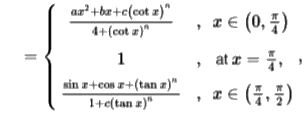let  where a, b, c are real constants and f(x)=limn→∞g(x). If
where a, b, c are real constants and f(x)=limn→∞g(x). If
limx→π4 f(x) exists, then c may be x→π4 equal to
A
1
B
12
C
3
D
-1
Text Solution
The correct Answer is:D
|
Topper's Solved these Questions
Similar Questions
Knowledge Check
Let g(x)=⎧⎪ ⎪ ⎪ ⎪ ⎪ ⎪⎨⎪ ⎪ ⎪ ⎪ ⎪ ⎪⎩ax2+bx+c(cotx)n4+(cotx)n, x∈(0,π4)1, at x=π4sinx+cosx+(tanx)n1+c(tanx)n, x∈(π4,π2)
where a, b, care real constants and f(x)=limn→∞g(x) If limx→π4 f(x) exist then c may be equal toA2B12C3D−1Let f(x)=a+b|x|+c|x|2, where a,b,c are real constants. The, f'(0) exists if
Ab=0Bc=0Ca=0Db=cLet f(x)=a|x|2+b|x|+c where a,b,c are real constants. Then f'(x) exists at x=0 if:
Aa=0Bb=0Cc=0Da=b
Let f(x)=limn→∞cosx1+(tan−1x)n. Then the value of ∫∞of(x)dx is equal to
View SolutionLet f:R→R be a real function. The function f is double differentiable. If there exists n∈N and p∈R such that limx→∞xnf(x)=p and there exists limx→∞xn+1f(x) , then limx→∞xn+1f'(x) is equal to
View SolutionIf f(x)=limm→∞limn→∞cos2mn!πx then the range of f(x) is
View SolutionLet f: R→R be a continuous function. Then limx→π/4π4∫sec2x2f(x)dxx2−π216 is equal to :
View SolutionIf the function f(x) satisfies limx→1f(x)−2x2−1=π, then limx→1f(x) is equal to
View Solution
